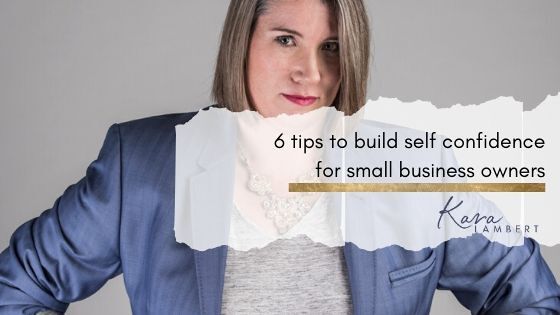“Kara, I just need more self-confidence”, “I need to get out of my own way”, “I need to stop holding myself back”. It’s generally what our conversations come down to, no matter what we start with. Generally, it starts with wanting to learn how to promote their small business on social media, then after a little while, the truth comes up. It’s really a lack of self-confidence that is stopping them progressing.
How can a lack of self-confidence show up?
Procrastination
Don’t put off until tomorrow what you can put off until next week. Amiright? You suddenly need to tidy your desk, do some washing, check your emails or social media. Anything. Anything rather than what you’re meant to be doing.
Finding a dozen different things to do rather than doing the one thing that needs doing is a common symptom of many things, including a lack of self-confidence.
Procrastination can also look like planning and perfectionism, but deep down these can both hide a lack of self-confidence.
I can honestly say that this article has taken me three-times longer to write than any other and the word count is the same. I’ve not gone off to do research, but boy have I procrastinated – so much so that I’ve deleted Facebook from my browser tabs.
Questioning or second-guessing
 I know my self-confidence was beaten by a number of people questioning my ability. It got to the point that I questioned my own. You know that thing where you hear something often enough, you begin to believe it. It sucks!
I know my self-confidence was beaten by a number of people questioning my ability. It got to the point that I questioned my own. You know that thing where you hear something often enough, you begin to believe it. It sucks!
To be honest, I’ve found the constant doubt is draining. Not only does it take a lot of internal dialogue, it takes a lot of energy, and it uses up a lot of time. All things I could be putting to better use elsewhere.
Perfectionism
I just need to do xyz. I just need to add ABC. It’s not quite right. It needs to be perfect. Do I have all of them? (Geez, you’d think I was a perfectionist by that last question)
Perfectionism avoids criticism, rejection, shame, and just doing that thing. It takes time and every perfectionist I’ve met (I’m not one, and I feel like the antithesis at times) has said that it is utterly exhausting.
The constant judgement, comparison, and/or questioning means that nothing is ever achieved and that wins are never made and certainly not celebrated. Celebrations don’t occur because things are never good enough.
Perfectionism can be debilitating, depressing and extremely time-consuming.
Getting advice from others
There is a time and a place for everything and this is certainly one of them. Yes, I know that asking for advice in big Facebook Groups is a (marginally) covert way to draw attraction to your brand. It’s a way to create controversy. I’m not talking about this. When you can’t make a decision and you have to ask for advice from others, sometimes you truly don’t know and sometimes you truly don’t trust that you’re making the right decision. Or perhaps you’re always asking the one person for advice. (And it’s not someone on that list, see below)
Deferring to someone can hide a lack of trust in oneself. It can be a symptom of people-pleasing (raises hand here). Some people also do it so they have someone to blame (but that’s unlikely to be anyone reading this as they generally don’t like what I write).
The problem with this habit is that the turn around takes time and the vast majority of the people asked will not have or understand your business (or audience) as well as you. They may have more experience, but that’s the only place they can give advice from and their experiences may not be relevant to you, yours, or your business.
General low self-confidence
In general, low self-confidence can show up as fatigue, tasks taking longer, and a lot of internal dialogue (not a lot of it being constructive). It’s draining – I know because I still battle this. It takes courage and effort to overcome but I promise that each step you take releases you to be more of yourself and that feels incredible.
6 things to do to build self-confidence
First things first
The very first thing is to actually catch yourself doing it. This takes an ability to be mindful and questioning of your thoughts and actions. You may need to put a reminder somewhere that says something along the lines of, “Is this real or is it low confidence?”. Then you can try one, or all, of the following solutions.
Rip the bandage
If procrastination is your pet when it comes to testing your self-confidence then I suggest using Mel Robbin’s 5-second rule. Count to 5 and then start the task.
Pomodoro
 Never heard of the Pomodoro technique? It’s where you spend a block of time working on a task, anywhere from 5 to 20 minutes, and then you do something you enjoy. The catch is that you must spend all of that active time on the task. Set a timer on your phone and stick to it.
Never heard of the Pomodoro technique? It’s where you spend a block of time working on a task, anywhere from 5 to 20 minutes, and then you do something you enjoy. The catch is that you must spend all of that active time on the task. Set a timer on your phone and stick to it.
Live in alignment with your beliefs and values
It’s hard to live in self-doubt when you are living in alignment with your beliefs and values. I promise it takes time and practice but when it comes down to it there are 3 things you need to be able to get yourself moving:
- Be mindful of what is driving your behaviour & ask yourself if you are acting from a place of self-doubt
- Remind yourself of what your core beliefs & values are
- Act from your core beliefs & values rather than reacting from a place of doubt or fear.
A person in your corner
Sometimes it’s easier if we know that someone has our back. Perhaps it’s a safety in numbers thing. I know I feel safer knowing that I have a handful, and I do mean just a few, people who believe in and support me – no matter what.
Who are they for you? Write down their names & keep the list close. When you are feeling uncertain, look at the list or have a chat with them. Most of all know that they believe in you, even when you’re uncertain of yourself.
Small wins
When we focus on the big goal it can seem insurmountable and we can lose confidence. While we can break a task down into more manageable chunks, we can also break them down into ones that we know we will succeed at. Having had some success at a task can give us the confidence to move forward and try more – to do more. This builds self-confidence. This is exactly why I celebrate the wins in my Facebook Group each Friday.
Get help
To overcome a lot of my self-confidence issues, I used Cognitive Behavioural Therapy under the guidance of a psychologist. From there I used the same techniques to uncover and work through further issues as they arose. Rebuilding self-confidence is a journey, most of us have lived with it for years and that takes time to sort through. I want you to know that I am here to help you unpack using the techniques I’ve learnt, tried, and tested. I’d love to help you be more self-confident & I encourage you to check this page out for help to build self-confidence, overcoming fear of failure, Imposter Syndrome, or fear of success.
.

